The Importance of Soft Skills: How to Assess Them During Recruitment
In today's workplace, technical skills alone can only take you so far. While having the right hard skills is crucial, they’re just one part of the...
3 min read
 Tasha Burks
:
Sep 18, 2024 6:30:00 AM
Tasha Burks
:
Sep 18, 2024 6:30:00 AM
In today's workplace, technical skills alone can only take you so far. While having the right hard skills is crucial, they’re just one part of the equation. What really sets a great hire apart often comes down to their soft skills—those personal attributes that help people communicate, collaborate, and adapt well with others. But how do you assess these qualities during the recruitment process? Knowing their value and figuring out how to assess them can make all the difference in finding the right fit for your team.
.png?width=1600&height=700&name=Untitled%20design%20(4).png)
Soft skills, often referred to as people skills, include traits like communication, teamwork, adaptability, problem-solving, and emotional intelligence. You can pick up hard skills through education or training, but soft skills are usually developed through life experiences and reflect a person’s inherent character.
The role of soft skills in the workplace is significant. Employees who excel in these areas tend to work well with others, foster strong client relationships, and handle changes with ease. These skills are particularly important for leadership positions and can amplify the effectiveness of technical skills by enabling employees to communicate ideas clearly and navigate challenges calmly.
As AI takes over more everyday tasks, soft skills are becoming the key differentiator that sets candidates apart. Employers are realizing that someone with strong soft skills is more likely to contribute positively to team dynamics, enhance workplace culture, and produce better business outcomes.
Evaluating soft skills during the hiring process can be tricky since they aren’t as easy to measure as hard skills. Traditional methods like resumes and technical assessments mainly focus on a candidate’s hard skills and past achievements. However, these methods may not provide the full picture of a candidate’s potential to thrive in a collaborative and dynamic work environment.
Additionally, candidates often put their best foot forward during interviews, which can make it tough to assess their true interpersonal abilities. This means recruiters need to get creative in how they evaluate soft skills.
Behavioral Interview Questions
Behavioral interview questions are a tried-and-true method for assessing soft skills. These questions are designed to prompt candidates to share examples from their past experiences, giving you a glimpse into how they handle real-life situations.
Instead of simply asking if a candidate considers themselves a good team player, you could ask them to describe a time when they had to collaborate with a difficult team member. Their answer will give you insight into their conflict resolution abilities, empathy, and teamwork skills.
Situational Judgment Tests (SJTs)
Situational Judgment Tests (SJTs) are another effective tool for evaluating soft skills. These tests present candidates with hypothetical scenarios they might encounter in the workplace and ask them to choose the best response from a set of options. SJTs are particularly useful for assessing decision-making, problem-solving, and ethical judgment.
By analyzing a candidate’s choices, you can get a better sense of how they would handle real-world challenges, which can help you determine whether they possess the soft skills needed for the job.
Peer and Team Assessments
Getting current team members involved in the hiring process can also be a great way to assess a candidate’s soft skills. By having candidates interact with potential colleagues through group interviews or collaborative tasks, you can observe how they communicate, contribute, and adapt in a team setting.
Feedback from peers can offer a different perspective, helping you determine if the candidate would be a good cultural fit for your team.
Personality Assessments
While personality assessments aren’t a definitive measure of soft skills, they can offer additional insights into a candidate’s interpersonal traits. Tools like the Myers-Briggs Type Indicator (MBTI) or the DiSC assessment can help identify characteristics that align with the soft skills required for a particular role.
However, it’s important to use personality assessments as just one piece of the puzzle, alongside other evaluation methods, rather than relying on them exclusively.
Hiring for soft skills isn’t just about finding someone who can do the job—it’s about building a strong workplace culture where everyone can thrive. When employees have the right balance of technical and soft skills, they’re more likely to collaborate effectively, innovate, and contribute positively to the organization’s goals.
A focus on soft skills during recruitment can also lead to higher employee satisfaction and retention. People who feel valued for their interpersonal strengths are more likely to be engaged, motivated, and committed to their roles.
In the modern workplace, soft skills are just as important—if not more so—than technical abilities. As work continues to evolve, the ability to communicate, adapt, and collaborate effectively is becoming increasingly essential. By incorporating strategies to assess soft skills during the recruitment process, you can ensure that you’re hiring candidates who will not only excel in their roles but also contribute to a positive and productive workplace culture.
In today's workplace, technical skills alone can only take you so far. While having the right hard skills is crucial, they’re just one part of the...
In today's competitive business landscape, company culture is more than just a buzzword—it's a key differentiator that can attract top talent, retain...
The recruitment process doesn’t end when a candidate accepts an offer—it continues well into their first days and weeks on the job. The onboarding...